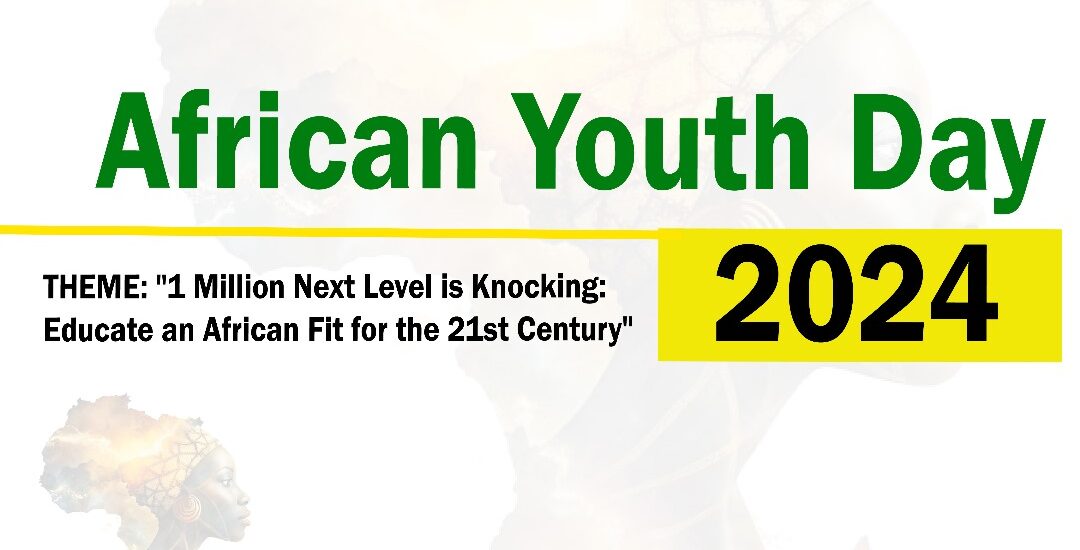- November 1, 2024
- Posted by: aaycweb
- Category: Articles

African Youth Day is a significant occasion that highlights the crucial role of the young people in shaping the future of the continent. The theme for this year—“The place of the youth in the AU agenda 2063”—is not just a call to action but a necessity for the continent’s future. It emphasizes the importance of youth engagement in the African Union’s vision for a prosperous and united Africa.
Agenda 2063 envisions an Africa that is integrated, peaceful, and prosperous driven by its own citizens, particularly the Youth. With over 60% of Africa’s population under the age of 25, the involvement of young people in decision making processes is essential. They are not just the leaders of tomorrow; they are the leaders of today. By actively participating in political, economic and social spheres, the youth can influence policies that affect their lives and communities.
Across the continent, young people are stepping up in politics, entrepreneurship, and civil society, driven by a vision of Africa as a continent of opportunity and innovation. As African Youth Day approaches on November 1st, the achievements and aspirations of African youth demand a spotlight.
Youth participation in governance is not only desirable but critical to Africa’s progress. However, African youth have traditionally been underrepresented in political leadership positions. According to the Mo Ibrahim Foundation’s 2023 Governance Report, only 14% of Africa’s parliamentary seats are occupied by individuals under 35. Yet, there is a growing wave of young leaders striving for representation.
Nigeria through the “Not Too Young to Run” movement, has successfully lowered the age requirement for political offices. This movement led to a 60% increase in youth candidacy in local elections in Nigeria since 2019, says Dr. Amina Mohammed, Deputy Secretary-General of the UN. “Young people are finding their voices in political spaces that once excluded them,” she remarks, highlighting the importance of these reforms in empowering young Africans to lead.
In the area of Economic power, economic growth in Africa is often driven by the informal sector, where many young people find work. However, recent trends show a shift toward formal entrepreneurship, with young Africans establishing tech startups, social enterprises, and green businesses that cater to local and global markets. The African Development Bank (AfDB) reports that youth-run enterprises make up 22% of all new business formations across Africa annually, a significant contribution to job creation.
In Kenya, a young entrepreneur named Peter Kamau co-founded M-Farm, an agritech platform connecting smallholder farmers directly with buyers. His company has transformed lives for more than 100,000 farmers across East Africa. “We have proven that young Africans can drive change and create economic opportunities within our communities,” Kamau shared at the 2024 African Development Forum.
In the digital revolution, African youth have embraced the digital space as a tool for empowerment and change. Across the continent, social media has evolved into a powerful platform for social activism, digital education, and business. The 2024 State of Mobile Internet Connectivity Report by GSMA indicates that Africa saw a 25% increase in youth connectivity between 2020 and 2023, primarily due to affordable smartphones and data bundles.
Movements like #EndSARS in Nigeria, which mobilized millions on social media to demand police reform, demonstrate the potency of digital activism. “Social media is now the battleground where Africa’s youth are reclaiming their voices,” says Ayodele Odusola, Resident Representative of the UN Development Programme (UNDP) in Nigeria. Digital platforms have become a way to bypass traditional barriers to youth expression, enabling them to advocate for change directly and effectively.
Despite these strides, African youth continue to face significant challenges, including high unemployment rates, limited access to quality education, and political exclusion. According to the African Union’s Agenda 2063, achieving a prosperous Africa requires sustained investment in youth empowerment, education, and skills development.
Dr. Vera Songwe, former Executive Secretary of the United Nations Economic Commission for Africa, argues that, “Africa’s progress is directly linked to the opportunities we afford our young people. Investment in education, particularly STEM, is essential to equip them for future leadership.” The African Union’s recently launched African Youth Empowerment Program aims to address these challenges through grants and skill development programs.
On this African Youth Day, we applaud the accomplishments and visions of young Africans illustrate a continent poised for transformation. The future of Africa, shaped by the hands of its youth, is being crafted with resilience, ingenuity, and the courage to challenge the status quo. With continued support from governments and global partners, African youth can be at the forefront of driving the continent’s prosperity.
